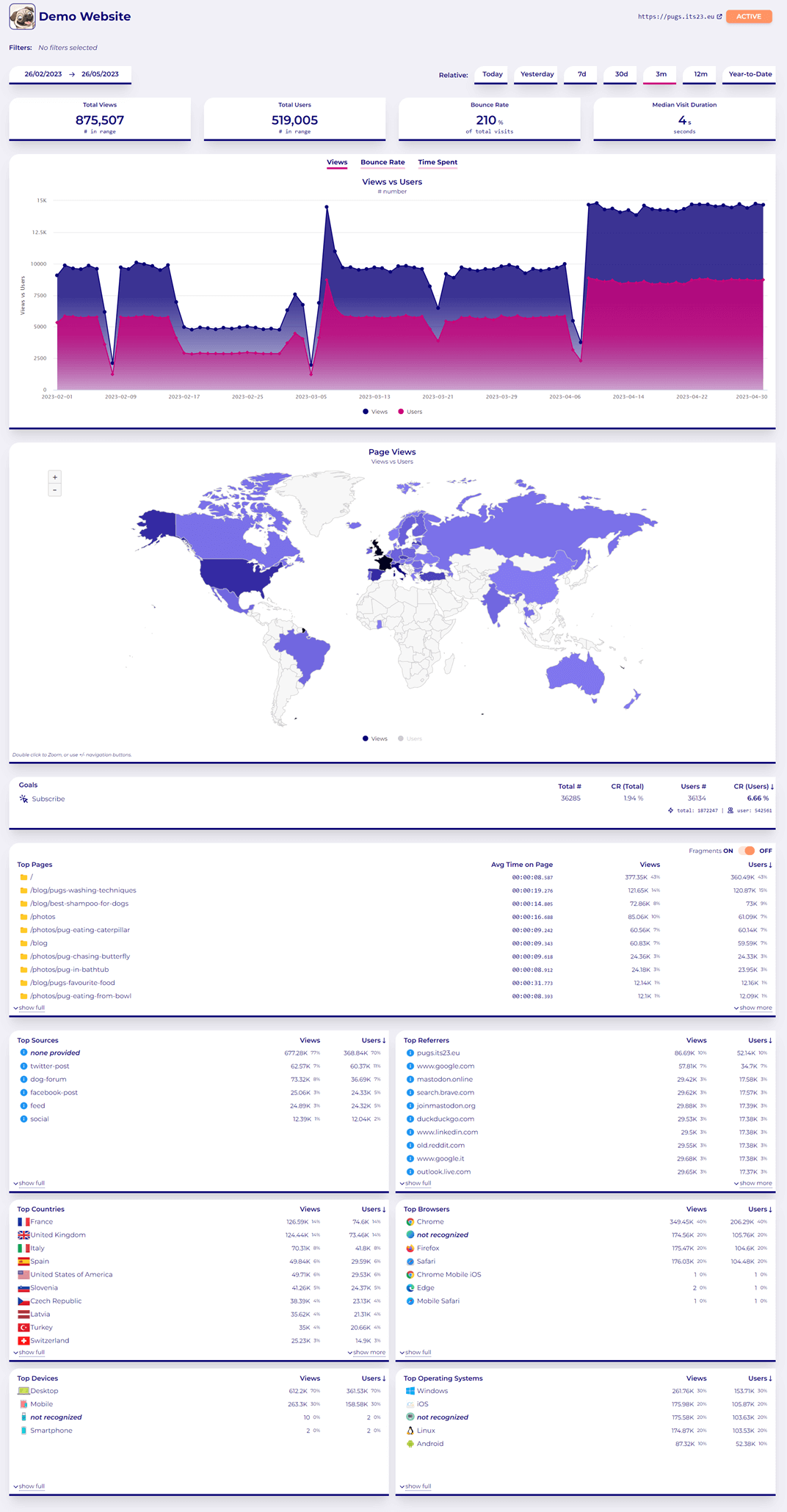Time for Google Analytics Alternative. Make it count.
Published on: 2023-5-26
The Internet and our digital world are in a constant state of change, underscoring the need for an accurate and intrinsic understanding of users' online behaviours. Web analytics tools, which have typically been dominated by Google Analytics, are crucial for interpreting meaningful patterns from user behaviour data. At the same time, the need for more responsible data privacy is growing with the increase in awareness about data privacy. The advent of stringent regulations like the General Data Protection Regulation (GDPR), and the more frequent use of browser-based tracking blockers and ad-blocker extensions, means we can no longer rely on the predatory practices of the past.
The pursuit of data protection-preserving analytical tools that avoid tracking individuals without their consent is no longer a novelty; it's a moral and legal imperative. Among the myriad of options, one solution that meets these standards is Wide Angle Analytics. However, before we delve deeper into this solution, it is crucial to understand the broader benefits of ethical web analytics.
The Business Case for Reliable and Ethical Data Collection
In today's digital business environment, data serves as a vital resource. Businesses rely on this data to understand user behaviour, enhance user experience, fine-tune marketing campaigns, and boost conversions. However, the crux of the matter lies not merely in data collection, but in the methods employed for its collection and utilization.
Conventional web analytics tools tend to track users extensively, often without clear consent, raising privacy issues. This situation highlights the growing need for advanced analytics tools that prioritize user consent, or lack of necessity for such, and are designed in accordance with the latest regulatory standards.
Such an approach has multiple business advantages. Firstly, it offers more reliable data and a gap-less click stream, as these tools are less likely to be impeded by Adblockers or browsers' tracking prevention mechanisms. This ensures a more accurate and dependable understanding of user behaviour.
Eliminating intrusive cookie banners and consent forms greatly enhances the user experience, providing a seamless and uncluttered browsing environment. These pop-ups typically serve as a distraction and can cause frustration among users, interrupting their engagement with the website's content and services. By leveraging a privacy-respecting analytics solution, businesses can bypass the need for such consent forms, offering a more streamlined user experience. This, in turn, can positively impact customer conversion rates. An uninterrupted browsing experience keeps the user's focus on the website's offerings, increasing the likelihood of them engaging with the site, making purchases, or signing up for services.
A more user-friendly and privacy-conscious approach to web analytics doesn't just respect the users' rights; it also potentially boosts the effectiveness of the business's online presence and can improve ROI on advertising and digital marketing spending. Reliably data means that you can feed money towards campaigns that actually work. It is time to lift the fog of war and focus on value driving initiatives.
Adapting to Google Analytics 4: Is the effort worth it?
Google Analytics, also known as Universal Analytics, has long been the industry standard for tracking, analysing, and reporting site data. However, Google has recently introduced a new version—Google Analytics 4 (GA4), set to replace the older variant on the 1st of July 2023. GA4 is a more complex tool that offers an unfamiliar interface and novel features. It focuses more on customer-centric measurement instead of the traditional session-based model. You wouldn't be far off, thinking that it is no longer a web analytics service, but a full fledge data analytics platform.
While this shift promises improved data analytics and privacy capabilities, it also presents a learning curve for users accustomed to the Universal Analytics interface and functionality. The transition to GA4 signifies a necessary evolution, although it requires users to adapt and familiarize themselves with the enhanced complexity of the new system.
Given the complexity and unfamiliarity of Google Analytics 4, along with lingering privacy concerns, businesses might find it more beneficial to consider alternative solutions. Instead of transitioning to GA4, which, despite its enhancements, still prompts questions about compliance and user privacy, businesses have the opportunity to seek more ethical web analytics options. These alternatives prioritize user consent and data privacy, align with regulatory standards, and often, provide a user-friendly and straightforward experience. This approach not only addresses the practicalities of data analytics, but also fosters trust and demonstrates a company's commitment to ethical data practices.
GDPR Compliance: More Than Just Privacy Focus
There is typically a misconception that being privacy-friendly means being GDPR-compliant. The GDPR compliance goes much beyond just privacy considerations. It is about adherence to local laws and regulations, documentation, and transparency in data handling processes.
Most tools that claim GDPR compliance often fall short in truly embracing these aspects. It is important to understand that GDPR compliance isn't a one-time tick box exercise or fancy badge on a vendor's page. It's a continuous process that requires regular monitoring, updating, and documentation to ensure complete compliance.
This is where tools like Wide Angle Analytics come into play. They are designed with GDPR compliance as an integral part, ensuring they not only respect user privacy but also adhere to all necessary regulatory requirements.
Wide Angle Analytics: Strictly GDPR-Compliant Web Analytics
The Wide Angle Analytics is exceptionally well aligned with the principles discussed above. It's a tool designed with a keen focus on reliability, user consent when necessary, and GDPR adherence, thereby ensuring that it provides web analytics data in an ethical and compliant manner.

In this new post-Google Analytics world, we welcome choice. It is no longer one size fits all and BigTech monopoly.
A Paradigm Shift: From Quantity to Quality
The shift towards legal and compliant web analytics signals a larger change in the digital world, a move from data quantity to data quality. It's not about collecting heaps of data any more; it's about collecting the right data in the right way. It's about respecting users' rights to privacy while still gaining the insights needed to drive business growth.
Nowadays, there truly is an abundance of choice in the world of web analytics. Whether you're just getting started with analytics or contemplating switching from Google Analytics, you'll find a rich array of alternatives, from SaaS vendors to self-hosted solutions.
Go to your favourite search engine and look for Google Analytics alternatives, you will find numerous services and products that offer web analytics solutions.
Yet, as a business or website operator, remember that the responsibility for data collection rests squarely on your shoulders, particularly under GDPR regulations. Therefore, choosing the right analytics tool isn't a decision to be made lightly. You must thoroughly vet potential vendors, ensuring they offer strong privacy procedures and transparent policies, while also providing the specific features that meet your business needs. In the end, the ideal choice will be a perfect blend of data processing standards and functionality, reflecting the true values and strategic requirements of your business.
Sounds complex? We will make it simple. Click here to create an account and start using Wide Angle Analytics today. It's really that easy. We have guides and integrations for most of the popular platforms and if you need help there, just click on a chat bubble and we will happily support you in your journey.